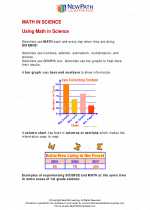Microbiology
Microbiology is the study of microorganisms, which are tiny living creatures that can only be seen with the help of a microscope. These microorganisms include bacteria, viruses, fungi, and protozoa. Microbiology is an important field of science as it helps us understand how these microorganisms impact our lives, from causing diseases to playing a role in various ecological processes.
Study Guide for Microbiology
- Introduction to Microorganisms: Learn about different types of microorganisms and their characteristics.
- Microbial Cell Structure: Understand the structure of bacterial, viral, fungal, and protozoan cells.
- Microbial Growth and Reproduction: Study the different methods of microbial growth and reproduction, such as binary fission, budding, and spore formation.
- Microbial Metabolism: Explore how microorganisms obtain energy and nutrients for their survival and growth.
- Microbial Genetics: Learn about the genetic material and mechanisms of genetic transfer in microorganisms.
- Microorganisms and Disease: Understand the role of microorganisms in causing infectious diseases and methods of disease control.
- Microorganisms in Biotechnology: Explore the applications of microorganisms in various industrial processes, such as food production, fermentation, and bioremediation.
- Microbial Ecology: Study the interactions of microorganisms with their environment and their roles in nutrient cycling and ecological balance.
- Microbiological Techniques: Familiarize yourself with laboratory techniques used in the isolation, cultivation, and identification of microorganisms.
- Microbiology and Public Health: Understand the significance of microbiology in maintaining public health and preventing the spread of infectious diseases.
By studying microbiology, you will gain insights into the fascinating world of microorganisms and their impact on human health, the environment, and various industries.
.◂Science Worksheets and Study Guides First Grade. Math in Science
Study Guide Math in Science - 1st grade level
Math in Science - 1st grade level  Worksheet/Answer key
Worksheet/Answer key Math in Science - 1st grade level
Math in Science - 1st grade level  Worksheet/Answer key
Worksheet/Answer key Math in Science - 1st grade level
Math in Science - 1st grade level  Worksheet/Answer key
Worksheet/Answer key Math in Science - 1st grade level
Math in Science - 1st grade level 

 Worksheet/Answer key
Worksheet/Answer key
 Worksheet/Answer key
Worksheet/Answer key
 Worksheet/Answer key
Worksheet/Answer key

The resources above cover the following skills:
EARTH AND SPACE SCIENCE
Earth’s Place in the Universe
Observe seasonal patterns of sunrise and sunset to describe the relationship between the number of hours of daylight and the time of year (e.g., more hours of daylight during summer as compared to winter).